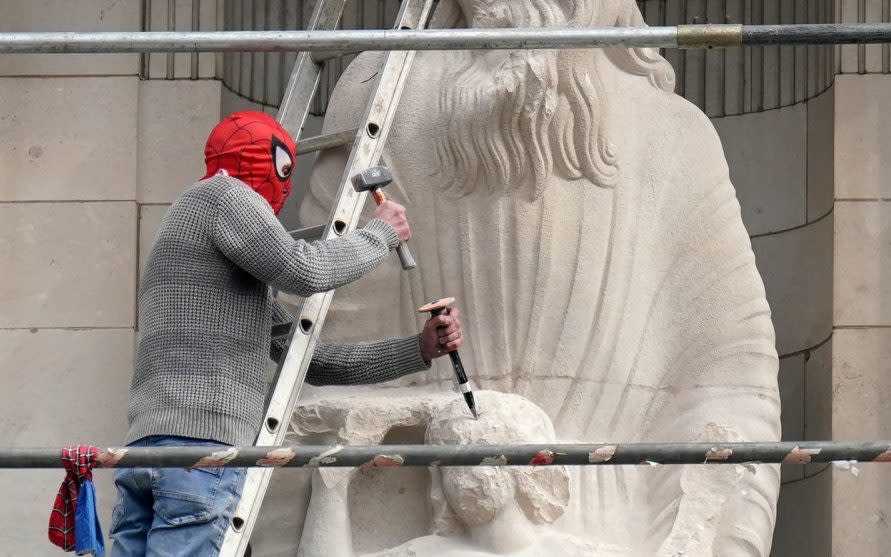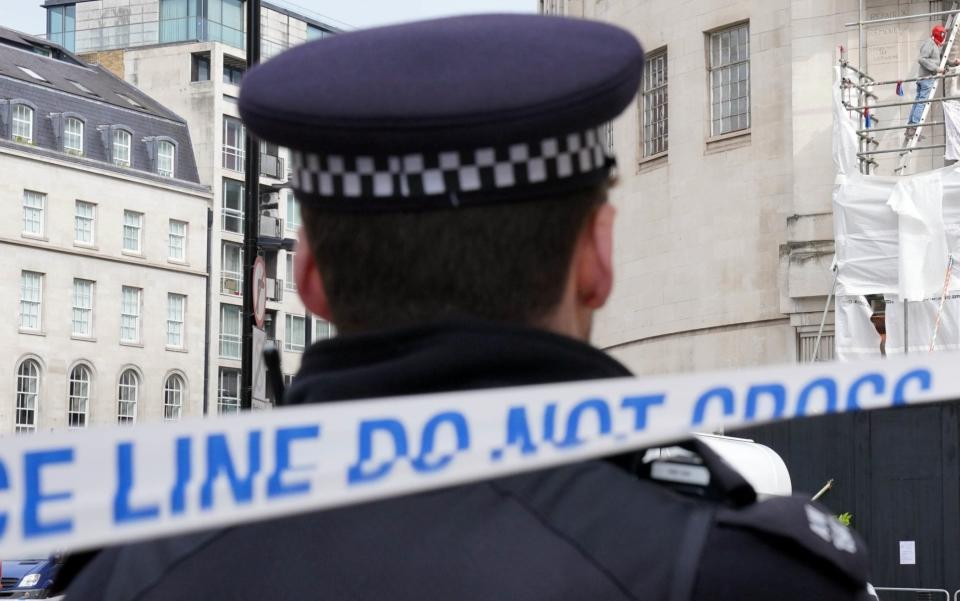Man in Spider-Man mask scales BBC HQ to attack controversial statue

- Oops!Something went wrong.Please try again later.
A man in a Spider-Man mask has scaled the BBC's London headquarters to attack a statue by controversial British artist Eric Gill.
The man was seen on scaffolding surrounding the sculpture in Portland Place on Saturday. He hung up a banner criticising the BBC and was heard shouting at a police officer.
Metropolitan Police officers attended the scene but said it had not been possible to safely detain the man "given the circumstances of the incident, including the height".
Specialist officers had been called to the scene, a spokesman added.
A police cordon is in place, with parts of Regent Street and the front of New Broadcasting House taped off.
A spokesman for the BBC said: "This is an ongoing incident and is currently a matter for the police and emergency services."
It comes only days after repair work was started to fix the damage caused to the Grade II listed statue in a previous attack.

Gill, who created the sculpture depicting Prospero and Ariel from Shakespeare's The Tempest, sexually abused two of his daughters.
The statue, which was commissioned by the BBC, was unveiled in 1933. Gill was among the most prominent sculptors at the time until his death in 1940 but his diaries, published much later, detailed the sexual abuse.
Last year, Christie’s auctioneers stopped selling Gill's work because of his problematic past. Save the Children no longer uses a logo with the Gill Sans typeface, designed by Gill and released for public use from 1928.
More than 3,000 people have also signed a petition demanding the removal of the sculpture.
The latest attack on the statue follows a similar incident in 2022, when a man was arrested on suspicion of criminal damage after defacing the work, in an apparent protest against Gill.
The corporation said at the time that it had no plans to remove the statue of Ariel, saying that when it was commissioned in 1933, it “was seen as an appropriate symbol for the new dawn of broadcasting”.
The statue has attracted controversy since it was installed, when critics voiced concern over the size of the boy’s genitalia - leading to the tabling of a question in the House of Commons.
Statue was set to be repaired
On Tuesday, the BBC said the repair work was agreed after "careful consideration" of the historical and cultural significance of the building, as well as discussions with leading cultural organisations such as Historic England.
All costs are being covered through the corporation's insurance and not the licence fee.
Scaffolding went up around the building on Tuesday, with expert stonemasons beginning to restore the work, carved from Caen stone, a type of limestone quarried in north-west France.
The broadcaster said the repair work would be used to provide additional context about the artwork and Gill, and that members of the public would also be able to access a QR code nearby.
Robert Seatter, head of BBC History, said: "Broadcasting House is a building of historical and cultural significance and one of the foundations of modern-day broadcasting, both in this country and around the world.
"We have a responsibility to maintain and preserve the building for generations to come.
"Alongside this, Gill's abusive behaviour and lifestyle are well documented and the BBC in no way condones his behaviour.
"So while it is right that the fabric of the building is restored, we must also ensure people are fully informed about the history connected to it."
The repairs were set to be completed by the end of June.

